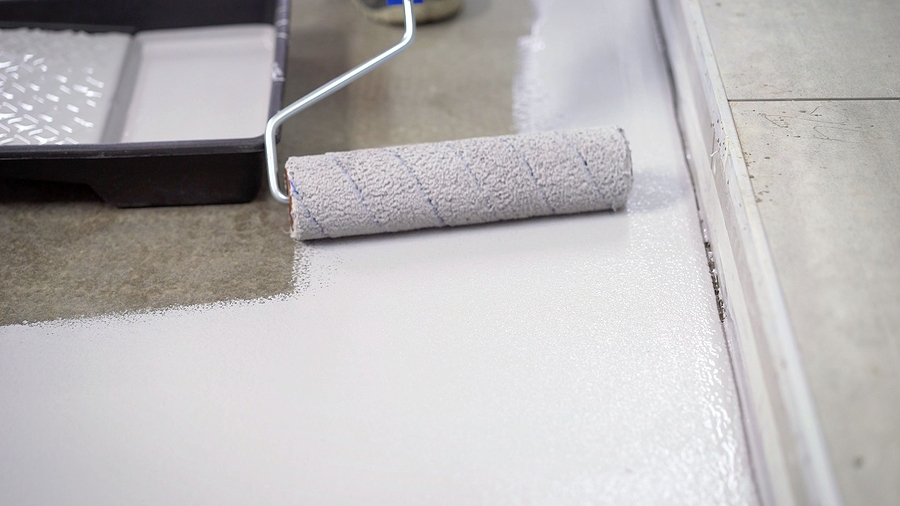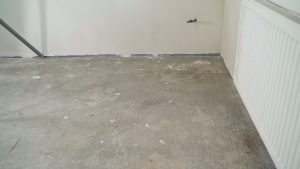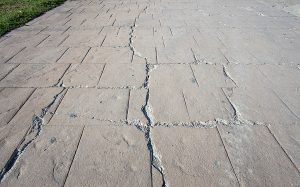If you’re looking at a bare slab and wondering, “Is epoxy or polyurethane better for concrete floors?” The truth is, both are excellent, but for different reasons. Epoxy builds thickness, bonds aggressively, and delivers great value. Polyurethane defends against sunlight, abrasion, and daily wear while keeping the floor looking new. Most professional systems combine them.
Where Epoxy Shines
Epoxy is a two-part thermoset that cures into a dense, hard layer with exceptional adhesion. Because it can be applied thicker, it helps level minor imperfections and creates a flat base for decorative flakes or quartz. Epoxy also stands up well to oils, fuels, road salts, and many common chemicals, which is why it’s a favorite in garages, machine rooms, and warehouses. If you need “serious” performance on a budget, epoxy returns a lot of protection per mil of thickness and is the go-to base layer in many commercial and residential systems.
Where Polyurethane Shines
Aliphatic polyurethane (PU) is naturally more flexible than epoxy, so it tolerates micro-movement and impact without chipping at the surface. It holds color under UV exposure far better than standard epoxies, making it ideal for sunlit spaces near windows and roll-up doors. PU also resists abrasion and scuffs, preserving gloss or a matte look, over time. If appearance six months and six years from now matters, a polyurethane finish is the difference between “nice” and “still looks new.”
Deciding Between Them (epoxy vs polyurethane flooring)
In practical epoxy vs polyurethane flooring terms: epoxy builds and bonds; polyurethane protects and preserves. Choose epoxy first when you need thickness, leveling, and a strong base for decorative media. Choose polyurethane on top when the area gets sunlight, steady foot or vehicle traffic, or you want long-term clarity and sheen retention.
Surface Prep and Moisture Matter Most
No coating can overcome poor preparation. Mechanical profiling (diamond grinding or shot blasting) opens the surface and removes contaminants so resins can lock in. If your slab has moisture-vapor emission, a moisture-tolerant primer or mitigation layer may be required before epoxy. Skipping these steps invites blisters, peeling, or cloudy spots—no matter which chemistry you pick.
Why Most Durable Floors Are “Systems,” Not Single Coats
The most trusted stack is simple and effective: an epoxy primer to wet out the slab and boost adhesion; an epoxy body coat to add build and encapsulate decorative chips or quartz; and an aliphatic polyurethane topcoat for UV stability and abrasion resistance. You can tailor the topcoat to high-gloss, satin, or matte, and introduce fine traction media for wet areas or sloped entries. Fast-cure options like polyaspartic have their place, but epoxy-plus-PU remains a proven, versatile solution for garages, workshops, showrooms, and light industrial spaces.
Chemical Resistance and Appearance
Both chemistries handle chemicals well, but differently. Epoxy is excellent with many oils, fuels, and solvents; polyurethane tends to shrug off surface staining and rubber transfer while keeping its finish under abrasion. For design, epoxy is the ideal canvas for solid colors, metallic effects, or broadcast flake fields because it self-levels and locks in media cleanly. Polyurethane then seals that design under a tough, UV-stable film.
Final Verdict: Which Is Better?
So, is epoxy or polyurethane better for concrete floors? If you need structural build, a strong bond, and cost-efficient thickness, epoxy wins. If you want long-term gloss or matte retention, UV stability, and superior abrasion resistance, polyurethane wins on top. In many real-world projects, the best answer is both: epoxy underneath for strength and leveling, polyurethane above for beauty and durability.
Ready to spec the right system for your space? Get a tailored recommendation, film builds, texture, and finish, based on traffic, sunlight, chemical exposure, and your style goals.
Let’s plan your floor. Request your custom epoxy + polyurethane system quote today.



